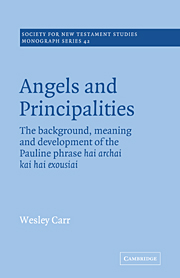 Angels and Principalities
Angels and Principalities PART 4 - Final Remarks
Published online by Cambridge University Press: 06 January 2010
Summary
The conclusions of this study have been drawn in each section as it has been completed. There is, therefore, no need now to list them in detail, and I shall content myself with a summary alone.
The first clear conclusion must be that the historical situation in which the early Christians began their mission was not that of a world overtly seeking release or salvation. This was a later mood, for which we have attempted to give an explanation for Asia Minor and the West. There was, therefore, no demand from outside the Church for a theology of cosmic, demonic powers, nor within the Church for an interpretation of Christ in terms of victory over hostile powers. Nor, as has been argued, is the letter to the Colossians directed at some local manifestation of such a belief.
The Jewish background from which Christianity grew said much about angels and showed a growing concern with demons. The language, however, clearly demonstrates that the chief emphasis was upon angels as a means both of interpreting the activity of God among men and of extolling the Lordship of Yahweh. Evil was increasingly focused in the figure of Satan, with whom the demons were gradually associated. The whole area of evil, however, was one of remarkable confusion and obscurity, especially when compared with the increasing confidence about names, ranks, and duties of the angels. Nowhere, either in Jewish thought or in Paul, is Satan so clearly delineated as he was in post-apostolic Jewish thought.
- Type
- Chapter
- Information
- Angels and PrincipalitiesThe Background, Meaning and Development of the Pauline Phrase hai archai kai hai exousiai, pp. 174 - 177Publisher: Cambridge University PressPrint publication year: 1981


